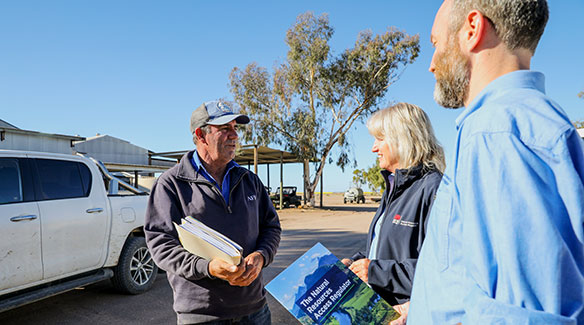We regularly run surveys that provide insights to help inform our activities and priorities.
We ran our first community benchmarking survey in 2020. A second survey was run in 2021, building on our understanding of the community we regulate. In 2023, another comprehensive community benchmarking survey was completed. In 2024, we conducted a shorter pulse survey.
Objectives of the research
Our surveys track community views on water law enforcement. They also track how our role as a regulator has changed over time.
We use the survey results to identify community concerns and work to address them.
In 2024, we conducted a shorter pulse survey of 596 licence holders, divided into three groups: regulated, unregulated and groundwater. The pulse survey results have highlighted a steady increase in industry awareness and trust in NRAR.

Key findings from the 2024 survey
- awareness of NRAR continued to increase with a 5% improvement in the last 12 months
- those who are aware of NRAR have a good understanding of the rules and have high levels of confidence in our work
- when there’s less water available, people see enforcement of the water rules as even more crucial. Simply put, the drier it gets, the more important it is to make sure that everyone is following the rules.
- More than half of those surveyed showed high levels of trust in the regulator.
Read a PDF summary of the 2024 survey findings here
We will continue our work to increase awareness to ensure water is shared fairly across NSW.
All our surveys are part of NRAR’s broader stakeholder engagement approach.
Next steps
We’ll be taking action to address concerns and comments from the survey in several ways:
Continue to educate, enable and encourage water users
We will continue to develop or source educational materials across a range of topics.
Highlight and promote our ability to detect non-compliance
We will deter wrongdoing by showcasing our ability to detect illegal activity. We will promote our successful enforcement actions to discourage misconduct.
Continuously improve our field visits and follow up communications
We will continue to provide quality training for staff. We will also provide clarity following our field visits.
Past surveys
In 2023, we conducted a comprehensive community benchmarking survey. A total of 1,615 people were surveyed, including 1,118 licence holders, 47 stakeholder groups and 450 members of the public.
Read the 2023 survey findings here (PDF, 997.7 KB)
In 2021, we conducted a community pulse survey amongst a much smaller group of approximately 350 regulated entities, 350 members of the public and 25 stakeholder groups.
Read the 2021 survey findings here (PDF, 703.13 KB)
In 2020, we commissioned our first community survey.
An independent research company conducted the survey with an anonymous sample of approximately 1000 regulated entities, 1000 members of the public and 40 stakeholder groups.